Generative AI has reshaped the way people discover information online, pushing search engines beyond the familiar list of blue links and toward more direct, conversational answers. Industry leaders like Google and Bing are swiftly integrating AI across their platforms to keep pace with rising stars like Perplexity and You.com. But the full potential of the AI-powered search engine is still unfolding, offering both great promise and serious risks.
Top AI Search Engines
- Bing
- Perplexity
- Brave Search
- ChatGPT Search
This shift is more than just a user-interface change — it’s redefining content strategy and search engine optimization (SEO), and has ushered in a new era of “generative engine optimization,” or GEO. Instead of competing solely for keyword rankings, publishers and businesses must now account for how AI systems parse, condense and reiterate their content into plain-language summaries. This raises both opportunities and challenges, as AI-generated answers often diverts traffic away from original websites altogether.
The technology underpinning AI-powered search is still maturing, but its influence on how information is being distributed and monetized is already becoming clear. To better understand where all of it is headed, it helps to look under the hood. Let’s take a look at how AI search engines work, what differentiates them from their more traditional counterparts and which platforms are worth keeping an eye on.
What Is an AI Search Engine?
AI search engines use artificial intelligence — specifically, methods like natural language processing (NLP) and machine learning — to better interpret context and understand the user intent behind each search query, with the goal of delivering more relevant results. In practice, that looks like generating concise, plain-language summaries of information gathered from across the web, in addition to — or instead of — pointing users to different websites.
“It’s not giving you links on a page,” digital marketing consultant Jordan Stevens told Built In. “It’s giving you one single answer.”
AI search engines resemble AI chatbots: They’re conversational and can answer questions in a fluent, human-like way. But unlike most chatbots, AI search engines have real-time access to the internet, which allows them to provide more comprehensive and current information. This positions them as a challenger to not only the incumbents, but also popular chatbots like ChatGPT.
11 Top AI Search Engines to Know
1. Google
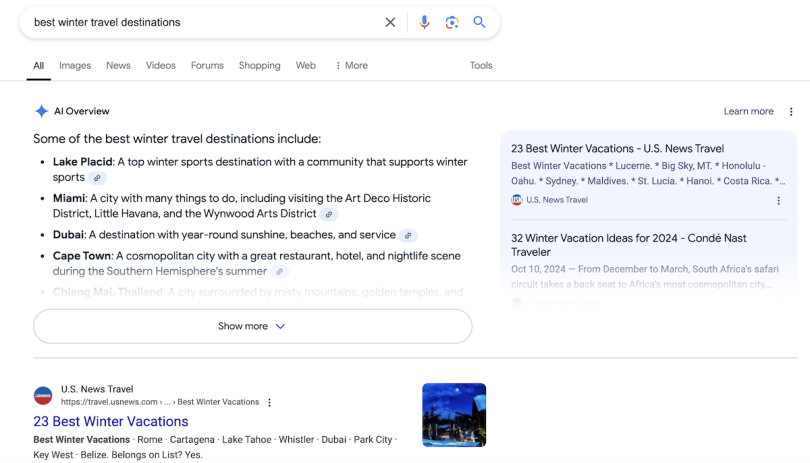
Google is the most popular search engine in the world, controlling about 90 percent of the search market. The company began overhauling its site in 2023 and has implemented artificial intelligence into virtually every part of its search process, using its Gemini model. Google’s AI Overviews provide an AI-generated summary of several of the top search results, along with links to resources for additional information. And Google’s planning tool can create anything from a meal plan to a vacation itinerary based on a single query; it even uses Gemini to populate and organize users’ search results on the page.
- Price: Free
- Best for: AI summaries
2. Bing
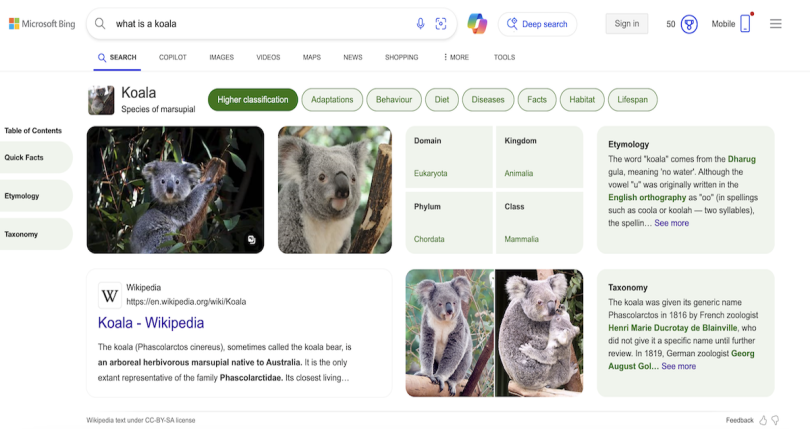
Bing is the second-most-popular search engine behind Google, accounting for about 4 percent of total search volume globally. Developed by Microsoft, Bing is powered by OpenAI’s GPT-4 large language model (LLM). In addition to its standard text-, voice- and image-based search capabilities, the platform comes with a conversational chat feature called Copilot, where users can ask questions and get detailed, human-like responses in return, plus line-by-line article citations. Copilot also comes with a vacation-planning feature, a cooking assistant, an AI image generator and a tool that answers fitness-related questions.
- Price: Free
- Best for: Visual-heavy search results
3. Perplexity
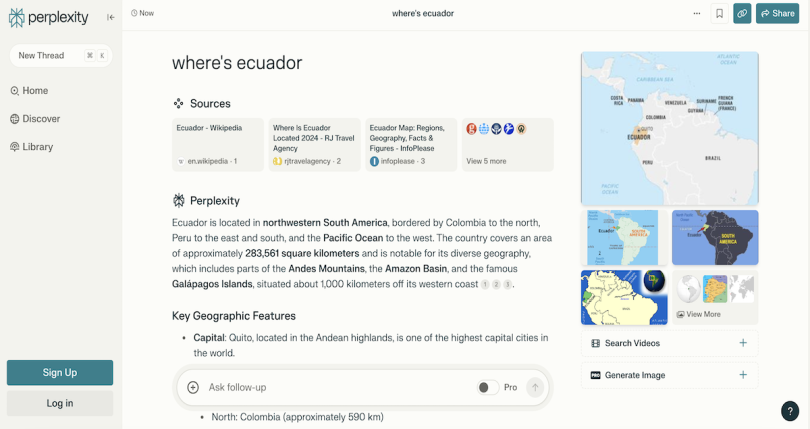
Launched in 2022, Perplexity provides AI-generated summaries of search results, with links to sources in a panel at the top and a list of follow-up questions at the bottom — similar to Google’s “people also ask” feature. It also allows users to narrow their search to a specific set of sources, like YouTube videos or Reddit posts. Perplexity’s free version runs on OpenAI’s GPT-3.5 LLM and its own AI model. Users who upgrade to the Pro version can choose between several other models too, including GPT-4 and Anthropic’s Claude 3.
- Price: Free, with a more advanced Pro version available for $20/month.
- Best for: In-depth searches
4. Brave Search
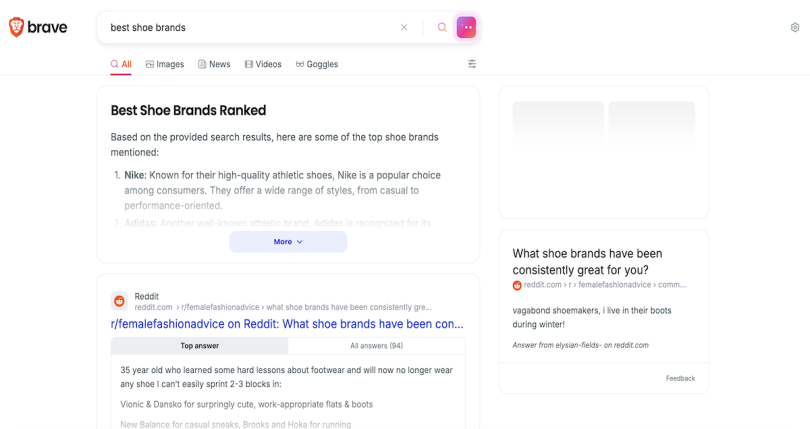
Brave Search provides quick, AI-generated insights in response to any natural language query, but it doesn’t rely on major search engines like Google or Bing to do so. Instead, the company says its answers are based on its own independent search index, claiming that this removes the “bias” and “censorship” that can come with “big tech’s SEO spam.” While Brave Search is free to use on any web browser, it also offers its own free companion browser that blocks trackers from collecting users’ data across the web.
- Price: Free
- Best for: Independent searches
5. You.com
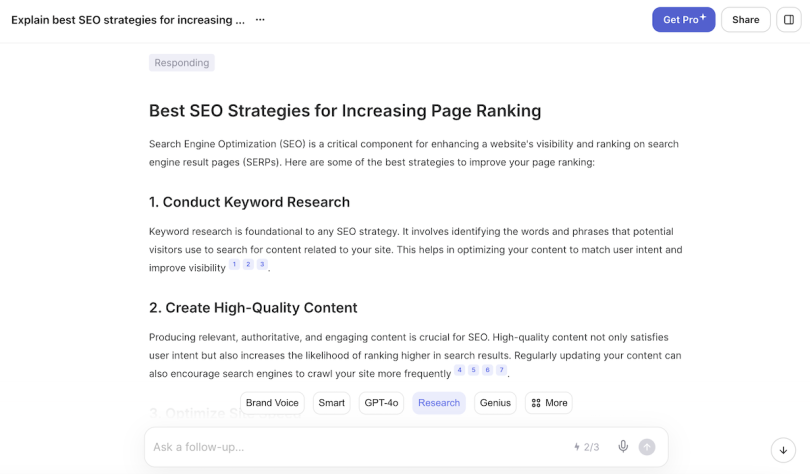
You.com says it’s the first search engine to integrate a consumer-facing LLM with real-time access to the internet, and that it was also the first to introduce multimodal chat capabilities to its interface. The platform functions more as an AI assistant than a standard search engine, and it comes in several different “modes,” ranging from Smart (for quick tasks like web searches and content creation) to Create (for image generation). It also offers a Private mode, where it doesn’t store users’ search activity or IP address.
- Price: Free, with more advanced versions starting at $15/month.
- Best for: Specialized searches
6. Andi
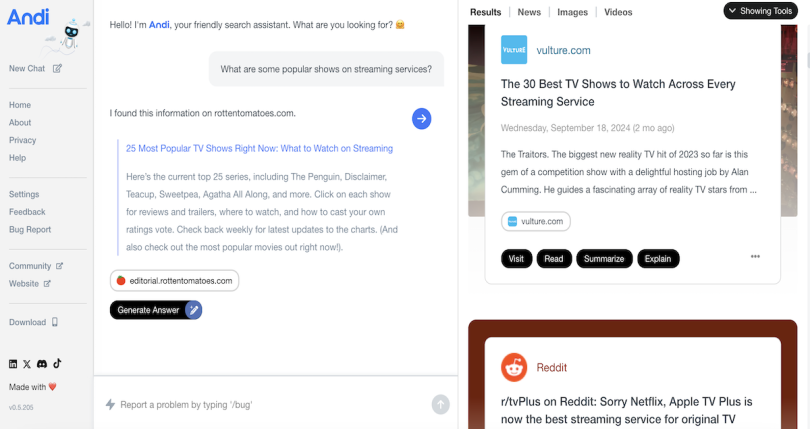
Andi functions as both a search engine and chatbot. It can answer users’ questions, explain complex topics and navigate the web, combining information from the top results to provide AI-generated insights (which can be viewed by clicking ‘Generate Text’). Users can also customize how the platform displays links, choosing between list, grid or feed layouts; and they can adjust the style to resemble Hacker News, markdown text or even a classic Google page. While Andi does collect users’ data, it says it does not share it with anyone else. The company also doesn’t log searches, and it blocks tracking and ads.
- Price: Free
- Best for: Tailored results layouts
7. Komo
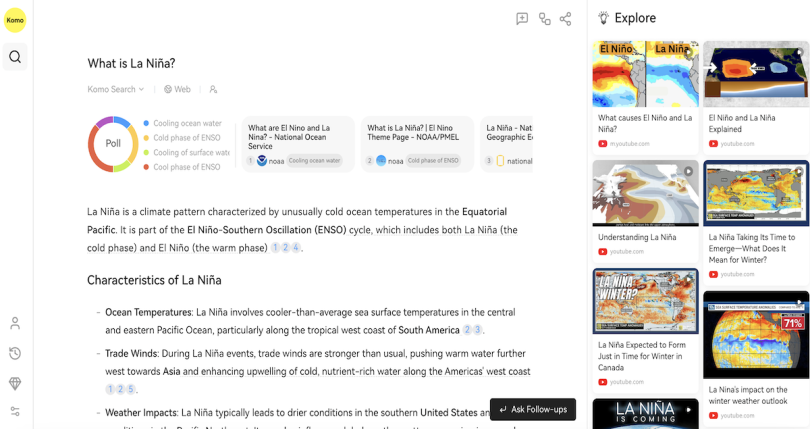
Komo is an ad-free search engine powered by its own LLM called Sunshine. It can be set to four different modes: Ask, Search, Research and Explore. With Ask, users get AI-generated responses to any question they ask, along with relevant links; Search works like a regular search engine, providing a list of relevant links; Research (only available to paying customers) provides AI-generated topic analyses, along with citations; and Explore provides links exclusively to videos in response to user queries.
- Price: A Basic plan costs $12/month, a Premium plan costs $24/month, a Business plan costs $160/month and an Enterprise plan varies in price.
- Best for: Personalized searches
8. Waldo
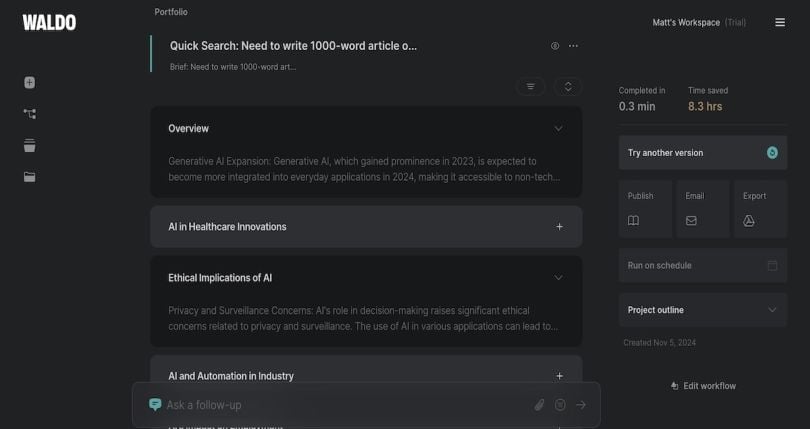
Handy for tasks that involve in-depth research, such as creating business pitches or brand strategies, Waldo uses search indexes pulled from sites like Google and Bing and repackages them into a customizable interface that can be finely tuned to what a user wants. Users can narrow their search results down to specific file types, highlight specific words or numbers, block specific sources and more. Users can also take notes on a built-in notepad, and then compile those notes into a single file or Google Doc that can be shared with others.
- Price: A Freelancer plan costs $149/month, a Teams plan costs $179/month/person, a Teams Pro plan costs $199/month/person and an Enterprise plan varies in price.
- Best for: Business professionals
9. Phind
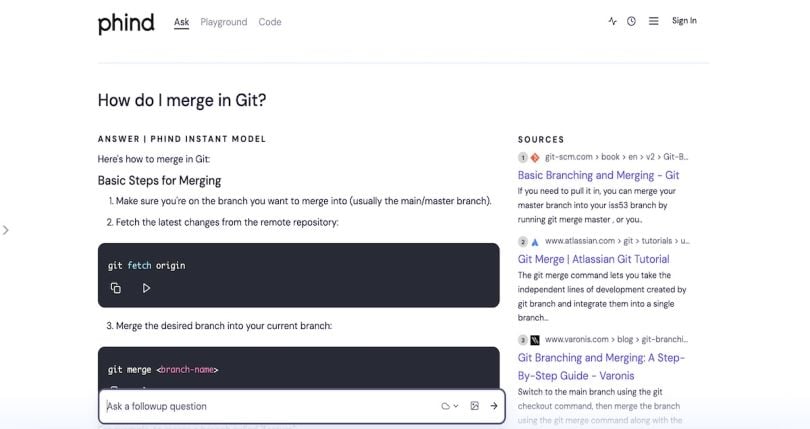
Phind is an AI search engine designed for software developers. Connected to both the internet and a user’s codebase (if they choose), the platform can answer all kinds of tech-related questions, ranging from ‘What are Mixtral 8x7B’s benchmarks?’ to ‘How do I make an HTTP request in JavaScript?’ — and includes links to sources alongside its AI-generated responses. Plus, in its Code interface, users can input their own codebase and ask questions specific to their code, automatically write unit tests or even run Python snippets right in the browser.
- Price: Users can sign up for Pro on either a monthly basis for $20/month or a yearly basis for $17/month. Phind also offers an Enterprise plan for $40/month/person.
- Best for: Developers and technical personnel
10. ChatGPT Search

ChatGPT search is OpenAI’s search engine that runs on a fine-tuned version of GPT-4o and is informed by user feedback from the SearchGPT prototype. Working with third-party search providers and partners, OpenAI has given ChatGPT search the ability to pull information from the internet in response to user queries and provide links to blogs, articles and other high-quality sources. Users can submit follow-up questions if they don’t get a satisfying answer, resulting in a more natural search experience.
- Price: Users with a paid subscription ($20/month/person) can access ChatGPT search at chatgpt.com and on the ChatGPT desktop and mobile apps. ChatGPT search will become available to free, enterprise and education users in the coming months.
- Best for: Conversational searches
11. Arc Search
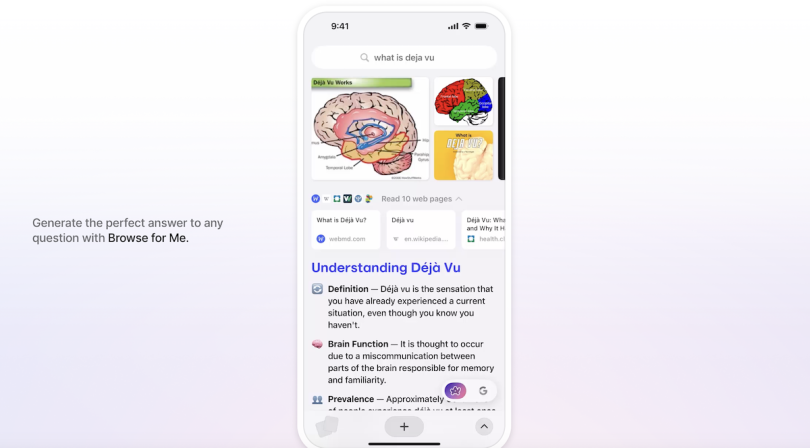
Arc Search is a mobile-focused AI search engine that curates entire web pages of content when users select the “Browse for Me” option. The latest product of The Browser Company, Arc Search can deliver comparisons, step-by-step instructions and recommendations. To provide an accessible mobile experience, Arc Search offers a reader mode, language translations and an auto-archive feature that reduces the clutter of old tabs. In addition, the search engine blocks pop-ups, ads, cookies and trackers.
- Price: Free
- Best for: Mobile searches
How Do AI Search Engines Work?
AI search engines work by first crawling and indexing web pages across the internet, extracting useful data like text, images and links. They use machine learning algorithms and natural language processing to further analyze the content and structure of the web pages so that they can understand them more deeply.
All of that information is then processed, organized and stored in a database, where it can be retrieved during the search process. AI search engines continuously update and refine their indexes as they learn from user interactions and new data.
When a user types in a query, AI search engines employ large language models to better understand user intent, analyzing the meaning of the individual words, as well as the patterns and relationships between them. Then they match the user’s query with the relevant search results in their indexes, even if the query is ambiguous or phrased in a conversational way.
Over time, some AI search engines collect data on users’ search history, what links they clicked on and other metrics to build profiles on specific users. This allows them to learn their preferences and deliver more personalized answers.
AI search engines also use LLMs to consolidate the information they find across the web into comprehensive AI-generated responses. Trained on large quantities of text data, large language models predict the next most logical word based on the context provided by previous words, allowing them to produce coherent, grammatically correct prose that closely resembles text written by humans.
How Are AI Search Engines Different From Regular Ones?
AI search engines share the same goal as traditional search engines: To provide users with answers that get them to click on a link, thus completing their “search journey,” as Stevens put it. “At the end of the day, that search engine wants to give you a quality answer.”
But they go about their job in different ways.
AI Search Provides Summaries, Regular Search Provides Links
Regular search engines display their results as a list of links, with short snippets of text underneath, while AI search engines can also generate concise summaries of search results — giving users an answer to their query without making them scroll and click through multiple websites.
AI Search Learns Over Time, Regular Search Resets
AI search engines are designed to continuously learn and adapt to user interactions and new data, improving their performance and the quality of their search results over time. Meanwhile, regular search engines work from scratch with every new query, without taking into account any previous queries or user interactions.
AI Search Focuses on Semantics, Regular Search Focuses on Keywords
Regular search engines primarily depend on keyword matching to interpret user queries, while their AI counterparts concentrate on semantics, considering the broader meaning of words within the context of the sentence. This allows the AI search engine to more thoroughly understand user intent and deliver search results that more closely match what a user is looking for.
“It’s really focused on what you’re telling it,” said Dennis Perpetua, chief technology officer of digital workplace services at tech company Kyndryl. “And then you’re able to refine the results with follow-up prompts or questions, instead of using funny keywords and plus signs and whatnot.”
By focusing on semantics instead of just keywords, AI search engines can deliver helpful results even when the intent is less obvious. For example, if a user asks for the “best places to eat near me with outdoor seating,” the AI search engine should be able to list nearby restaurants with patios, despite the fact that the query doesn’t contain the specific words “restaurant” or “patio.”
“AI search engines are making the ability to find things accessible, simply because you can describe from more of an emotional point of view and a semantic point of view, less from a keyword or accuracy point of view,” Perpetua continued. “It casts a wider aperture and filters answers down to be much more narrow more quickly than the general keyword search, where you manually have to keep tweaking things.”
Regular Search Only Accepts Text Queries, AI Search Accepts Images, Video and Audio
Regular search engines only accept text inputs. But some AI search engines have multimodal capabilities, meaning they are able to process and understand information from formats beyond just text, such as images, videos and audio. For example, a multimodal AI search engine could let users search for information using voice commands, or by taking a photo with their phone — providing a more intuitive and flexible search experience than just typing in questions.
Are AI Search Engines Better Than Regular Search Engines?
While AI search engines are great at helping to plan a birthday party or providing a simple explanation for why the sky is blue, they aren’t always the best choice for handling all the other tasks we use search engines for — like navigating to specific websites or following the progress of a sporting event in real time.
“AIs don’t do as well with fresh stuff and they don’t do well with outliers,” Stevens said. “Anything that’s an extreme outlier or that’s fresh, I think the AIs are going to struggle.”
AI search engines may also produce more biased answers. Regular search engines simply organize information as links for users to click on, read and interpret on their own, whereas AI search engines summarize content found on the web, generating new responses based on what it has learned. That means the results produced by an AI search engine are likely to reflect the biases of its developers, introducing bias into areas where there wasn’t any to begin with, said Davi Ottenheimer, a VP of trust and digital ethics at tech company Inrupt.
“AI search engines are disconnecting from the curators, the owners of the data,” Ottenheimer told Built In. “By adding AI in the middle, now you’re seeing the vision or the voice of the people who are writing and creating the AI algorithm.”
Like all generative AI, AI search engines are also prone to hallucinating, at times presenting falsehoods as facts. Some tools have incorporated line-by-line article citations to offset the problem, but the articles cited aren’t always accurate — and sometimes they don’t actually exist at all.
So while AI search engines may be more dynamic and interactive in nature than regular search engines, they don’t necessarily produce higher-quality responses than their AI-free counterparts.
Frequently Asked Questions
What is an AI-based search engine?
An AI search engine is a platform that uses artificial intelligence to interpret natural language queries, find relevant information, and generate concise summaries of that information — providing a more digestible and comprehensive online search experience.
How are AI search engines different from regular search engines?
AI search engines differ from regular search engines in several ways:
- Regular search engines display their results as a list of links, with short snippets of text underneath, while AI search engines can also generate concise summaries of search results.
- AI search engines are designed to continuously learn and adapt to user interactions, while regular search engines work from scratch with every new query, without taking into account any previous queries or user interactions.
- Regular search engines rely on keyword matching to understand, while AI search engines focus on semantics.
- Regular search engines can only accept text inputs, but some AI search engines have multimodal capabilities, meaning they are able to process and understand information from image, video and voice inputs, in addition to text.
How to use AI search engines?
The process of using an AI search engine is similar to that of a regular search engine: You enter a query into the search bar, wait a bit, and then review the results. But instead of producing pages of only links, AI search engines also provide concise summaries of the information they gather from the web — sparing you the need to scroll and click through various websites to find what you’re looking for.




